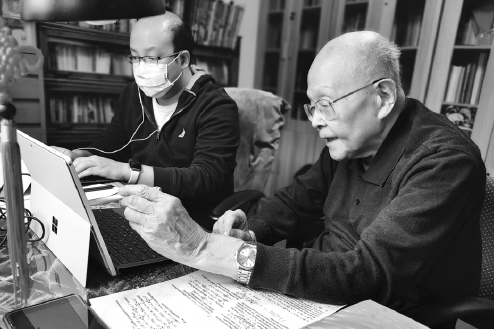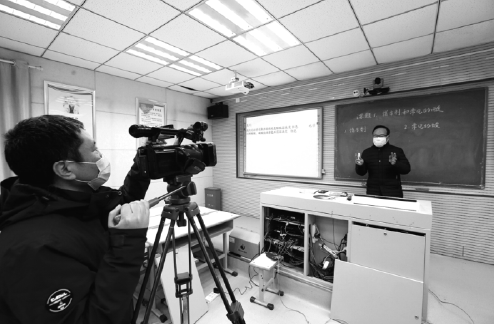Taking new tech in his stride
Students benefit as 95-year-old Tsinghua professor masters online teaching, Wang Qian reports.

New situations bring new solutions and Zhang Li, a 95-year-old professor at Tsinghua University, is proving to be master at what, for him, is a new method of teaching: online classes.
On Feb 20 he started his class in a novel way to keep his students engaged as schools nationwide delayed the opening of the spring semester due to the ongoing novel coronavirus outbreak.
With the assistance of a former student, Hu Jiazhong, who provided technical support, the oldest professor in Tsinghua who is still teaching began to offer his postgraduate course-frontier problems in quantum mechanics-online.
Having taught for 71 years, it is the first time that Zhang livestreamed his class. He has taught the subject since 1998.
Talking about online teaching, Zhang says: "My age may be the biggest challenge for me, because I cannot think as fast as I could in my younger years".
Using the Tsinghua Rain Classroom, an interactive teaching mini-program on WeChat, students can get lecture slides and raise questions on their tablets or smartphones.
"This teaching mode is very good, especially for students," Zhang says, on a video Tsinghua University released to China Daily, adding that in traditional classes, students are sometimes shy to ask questions, but online courses are different and students can leave messages any time in a WeChat group and this makes communication easier.
"These measures help students to be interested in physics, raise questions and think independently. In the future, they will dare to think about big issues in the field," Zhang says.
He adds that the teacher-student connection via technology should be maintained, and this will be beneficial to students.
For 32-year-old Hu, 10 years ago, Zhang's course opened a gate to the magical world of quantum mechanics. After graduating from the Massachusetts Institute of Technology in the United States last year, he became a teacher at Tsinghua.
"Zhang's class covers cutting-edge research, which is beyond textbooks and needs consistent study and exploration," says Hu.
Even though he has taught the course for more than two decades, Zhang still prepares the lectures by himself every year. Before the livestreaming class, he discussed the course plan with Hu several times and went through several rehearsals to get used to online teaching.
"His professionalism deserves respect and admiration," Hu says.
During the virtual class, Zhang keeps in mind that a delay in audio transmission might happen and he will turn each slide layout after a pause to ensure viewers can follow.
While he is teaching, Hu opens the class on another computer to check if the sound quality and internet connectivity are stable and he also keeps an eye on the WeChat group to see if students raise questions.
To help students better understand the course, Zhang and Hu answer questions online from 9:30 am to 11:30 am on Saturday.
As, probably, the oldest teacher livestreaming a course in the country, Zhang's class has gone viral on social media. Many internet users commented that Zhang proves it's never too late to learn.
Born in 1925 in Tianjin, Zhang began teaching at Tsinghua in 1957 and became the first head of the department of Physics when it was reestablished in 1982, according to Xinhua News Agency.
He usually works at least eight hours per day, and sometimes even on a Saturday, according to People's Daily.
Thanks to regular exercise, he is in good health and is as sharp as a tack.
In 1977, he started jogging every morning. The habit didn't stop until he was 90 when a doctor suggested he change to walking.
"Morning exercises help me figure out academic problems," Zhang says.
Apart from teaching, Zhang also frequently attends various lectures held by Tsinghua's Institute for Advanced Study.
When asked about retirement, he says: "It will be the time when my mind doesn't work. I will not surrender before that."
In the new semester, Tsinghua plans to offer 4,254 courses involving 2,681 teachers and 25,091 students. More than 3,000 of the courses are scheduled to be broadcast online.
Tsinghua, like other universities nationwide, have delayed the new semester and moved classes online in a bid to control the outbreak.
According to the Ministry of Education, so far, there have been 22 online education platforms offering more than 24,000 college courses for free. They cover 12 undergraduate disciplines and 18 majors in polytechnic and vocational education. Many of them are for-college-credit programs.
The ministry says that before the epidemic is under control, all colleges should remain closed. Zhong Nanshan, an academician at the Chinese Academy of Engineering, said at a news conference in Guangzhou, Guangdong province, on Thursday that he believes the epidemic will be brought under control on the Chinese mainland by the end of April.
The virus, which started in Wuhan, has infected more than 78,000 people and killed more than 2,700 across the country as of Friday.


Today's Top News
- Experts share ideas on advancing human rights
- Japan PM's remarks on Taiwan send severely wrong signal
- Key steps to boost RMB's intl standing highlighted
- Sustained fight against corruption urged
- Xi calls for promotion of spirit of volunteerism
- Xi calls for promoting volunteer spirit to serve national rejuvenation






























